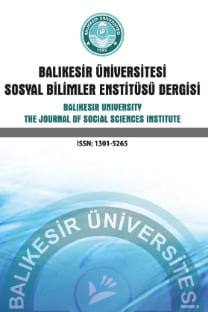OKUL YÖNETİCİLERİ İÇİN STANDARTLAR: EĞİTİM YÖNETİCİLERİNİN BİLGİ TEMELLERİ ÜZERİNE DÜŞÜNCELER
Son yıllarda toplumların yapısında sosyal, siyasal, ekonomik yönlerden meydana gelen değişmeler, eğitim alanını da etkilemektedir. Eğitim yönetimi alanında yapılan araştırmalar ise eğitim yöneticilerinin eğitim sorunlarına yeterince çözüm üretemediklerini ortaya koymaktadır. Bu durum, eğitim yönetiminin bilgi temellerini ve eğitim yöneticilerinin yetiştirilmeleri konusundaki standartları yeniden gündeme getirmektedir. Bu çalışmanın amacı, eğitim yöneticilerinin birer lider yetiştirilmeleri konusunda yapılan çalışmaları ana hatlarıyla tartışmaktır. Son yıllarda, bazı gelişmiş ülkelerde eğitim liderlerinin yetiştirilmeleri konusunda yapılan standartlaştırma çabalarından yola çıkarak, bu tartışmaların ülkemiz için ne anlam ifade ettiği değerlendirilmeye çalışılmıştır
Anahtar Kelimeler:
Eğitim liderliği, Eğitim Yönetimi, Eleştirel teori
STANDARTS FOR SCHOOL LEADERS: THOUGHTS ON THE KNOWLEDGE BASE OF THE EDUCATIONAL ADMINISTRATORS
In recent years, social, political and economical changes in the structure of societies have an effect the education field. The researchers on educational leadership indicate that educational leaders fail to provide solutions to the educational issues. This suggest that the knowledge basis and the standarts of educational leaders' training be put forward on the agenda. The purpose of this study is to examine and review the studies and the model/guiding principles of standards for school leaders who are moral agents and social advocates for the children and the communities they serve. In recent years, inspired by the standardization efforts to train the educational administrators in developed countries, what these discussions mean for our country were tried to be assessed
___
American Association of School Administrators, (1991), America 2000: Where School leaders Stand, Arlington: AASA.Aydın, A., (1996), Milli Eğitim Politikaları ve Şuralar, Ankara, Milli Eğitim Basımevi.
Balcı, A., (1993), Etkili okul: Kuram, Uygulama ve Araştırma, Ankara, Yavuz Dağıtım.
Bauldrillard, J., (1989), America, New York: Verso Press.
Bates, R., (1981), Towards a Critical Practice of Educational Administration, New York, AERA.
Bates, R., (1983), Educational Administration and the Management of Knowledge, Geelong, Deakin University Press.
Boyer, E. L., (1983), High School: A Report on Secondary Education in America, New York, Harper & Row.
Bursalıoğlu, Z., (1981), Eğitim Yöneticisinin Yeterlilikleri: İlköğretmen Okulu Müdürlerinin Yeterliliklerine İlişkin Bir Araştırma. Ankara, A.Ü.Eğitim Fakültesi Yayınları.
Campbell, R. F., & Gregg, R. T., (Eds.), (1957), Administrative Behavior in Education, New York, Harper & Brothers.
Council of Chief State School Officers, (1997, Interstate School Leaders Licensure Consortium (ISLLC): Standards for School Leaders, Washington, D. C, CCSSO.
Council of Chief State School Officers, (1996), Interstate School Leaders Licensure Consortium(ISLLC): Standards for School Leaders. Washington, D. C, CCSSO.
Dills, C. R., & Romiszowski, A. A., (Eds.). ,(1997), Instructional Development Paradigms, New Jersey, Educational Technology Publications.
Drucker, P. F., (1989). The New Realities, New York, Harper & Row.
Evers, C. W., & Lakomski, G., (1991), Knowing Educational Administration: Contemporary Methodological Contreversies in Educational Administration Research, Oxford, Pergamon.
- ISSN: 1301-5265
- Yayın Aralığı: Yılda 2 Sayı
- Başlangıç: 1998
- Yayıncı: Balıkesir Üniversitesi Sosyal Bilimler Enstitüsü
Sayıdaki Diğer Makaleler
HİSSE SENEDİ PİYASA ENDEKSLERİ VE TÜRKİYE
HAKANI MEHMED BEY DİVANI'NDA AYETLERDEN İKTİBASLAR
HAKANI MEHMED BEY DİVANI'NDA AYETLERDEN İKTİBASLAR
BALIKESİR YÖRESİNE GELEN FRANSIZ TURİST TALEP ANALİZİ
MİLLİ MÜCADELE DÖNEMİNDE ESKİŞEHİR MİTİNGLERİ VE ÇEKİLEN PROTESTO TELGRAFLARI
EDUCATION AND TRAINING IN TOURISM IN TURKEY : PROBLEMS AND PROSPECTS
KUZEYBATI ANADOLU'DA YAĞIŞ ETKİNLİĞİ
